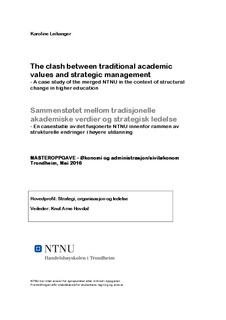| dc.description.abstract | Higher education is currently facing major challenges related to efficiency and legitimacy and
new solutions are often obtained from the private sector. In Norway, the landscapes of higher
education are being re-structured with focus on increased strategic management and
subsequent increased competitiveness. These changes have implications for the interpretation
of the meaning with the university today and in the future. Since higher education have been
characterized by ambiguity, conflicting objectives and competing logics this thesis have been
focused upon the possible conflict that emerges from the encounter between traditional
academic values and strategic management:
How can this conflict be understood, and what seems to be at stake?
To answer the problem statement, I conducted a qualitative research study of the merged
institution: Norwegian University of Science and Technology [NTNU], in light of structural
changes in higher education, based on an intensive and explanatory research design with an
abductive approach. The empirical data was generated through a preparatory document
analysis of higher education in an international perspective combined with four in-depth
interviews of two professors and two leaders at NTNU. The problem statement was
considered both in conjunction with the empirical material and the international analysis, and
by using different institutional perspectives it was discussed on the basis of organizational
theory for public organizations. The theoretical foundation had a transformative approach.
My findings documented how the entrance of strategic management challenged new methods
for carrying out the university’s core activities: research and education. The professors'
expressed values which was summarized as: (1) independence, (2) professional integrity, (3)
relevance, (4) humanism and respect, and (5) tolerance for diversity are under pressure by the
more modern cornerstones of accountability, efficiency and responsiveness. The professors
experienced a pronounced shift from prioritizing activities on a professional basis to
prioritizing activities at a strategic basis. Which was highlighted as a conflict between the
logic of appropriate behaviour and logic of consequences. What seemed to be at stake in the
eyes of the professors were among other things the attractiveness to work in the higher
education sector and the quality of work being under pressure by statistical quality indicators.
! iii!
The thesis main contribution has thus been to stress that when values and the creation of
meaning is overshadowed by too much focus on formal structures, it may quickly end up in a
paradox where the structures break down the quality they were intended to build. | nb_NO |
